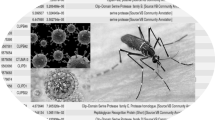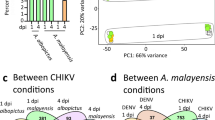Abstract
The mosquito Aedes aegypti is the principal vector that transmits dengue virus (DENV) to humans. The primary factors that trigger a susceptible or refractory interaction of A. aegypti with DENV are not well understood. In this study, our aim is to characterize the influence of vector genotype on differential gene expression of susceptible vs. refractory A. aegypti strains to DENV infection. To accomplish that, we identified differential expression of a set of complementary DNAs (cDNAs; n = 9,504) of the D2S3 (susceptible) and Moyo-D (refractory) strains of A. aegypti to DENV serotype 2 (JAM1409) and compared these results to the differential expression of cDNAs in a different susceptible vector genotype (Moyo-S) relative to the same refractory genotype (Moyo-D) identified from our previous study. We observed that, although the number of differentially expressed transcripts (DETs) was similar in both the studies, about ~95 % of the DETs were distinct between Moyo-D/D2S3 vs. Moyo-D/Moyo-S. This suggested that A. aegypti response, to infection of a given genotype of dengue, is largely dependent upon the vector genotype. However, we observed a set of common DETs among the vector strains that were associated with predicted functions such as endocytosis, regulation of autophagy, peroxisome, and lipid metabolism that may be relatively universal in conferring mosquito response to DENV infection.





Similar content being viewed by others
References
Behura SK, Severson DW (2012) Intrinsic features of Aedes aegypti genes affect transcriptional responsiveness of mosquito genes to dengue virus infection. Infect Genet Evol 12:1413–1418
Behura SK, Gomez-Machorro C, Harker BW, deBruyn B, Lovin DD, Hemme RR, Mori A, Romero-Severson J, Severson DW (2011) Global cross-talk of genes of the mosquito Aedes aegypti in response to dengue virus infection. PLoS Negl Trop Dis 5:e1385
Bennett KE, Olson KE, Muñoz Mde L, Fernandez-Salas I, Farfan-Ale JA, Higgs S, Black WC 4th, Beaty BJ (2002) Variation in vector competence for dengue 2 virus among 24 collections of Aedes aegypti from Mexico and the United States. Am J Trop Med Hyg 67:85–92
Bennett KE, Beaty BJ, Black WC 4th (2005) Selection of D2S3, an Aedes aegypti (Diptera: Culicidae) strain with high oral susceptibility to dengue 2 virus and D2MEB, a strain with a midgut barrier to Dengue 2 escape. J Med Entomol 42:110–119
Bosio CF, Beaty BJ, Black WC 4th (1998) Quantitative genetics of vector competence for dengue-2 virus in Aedes aegypti. Am J Trop Med Hyg 59:965–970
Bosio CF, Fulton RE, Salasek ML, Beaty BJ, Black WC 4th (2000) Quantitative trait loci that control vector competence for dengue-2 virus in the mosquito Aedes aegypti. Genetics 156:687–698
Brackney DE, Foy BD, Olson KE (2008) The effects of midgut serine proteases on dengue virus type 2 infectivity of Aedes aegypti. Am J Trop Med Hyg 79:267–274
Chauhan C, Behura SK, Debruyn B, Lovin DD, Harker BW, Gomez-Machorro C, Mori A, Romero-Severson J, Severson DW (2012) Comparative expression profiles of midgut genes in dengue virus refractory and susceptible Aedes aegypti across critical period for virus infection. PLoS One 7:e47350
Clemons AC, Mori A, Haugen M, Severson D, Duman-Scheel M (2010) Aedes aegypti: culturing and egg collection. Cold Spring Harbor Protoc 2010:pdb.prot5507
Colpitts TM, Cox J, Vanlandingham DL, Feitosa FM, Cheng G, Kurscheid S, Wang P, Krishnan MN, Higgs S, Fikrig E (2011) Alterations in the Aedes aegypti transcriptome during infection with West Nile, dengue and yellow fever viruses. PLoS Pathog 7:e1002189
de Hoon MJL, Imoto S, Nolan J, Miyano S (2004) Open source clustering software. Bioinformatics 20:1453–1454
Diallo M, Ba Y, Faye O, Soumare ML, Dia I, Sall AA (2008) Vector competence of Aedes aegypti populations from Senegal for sylvatic and epidemic dengue 2 virus isolated in West Africa. Trans R Soc Trop Med Hyg 102:493–498
Fury W, Batliwalla F, Gregersen PK, Li W (2006) Overlapping probabilities of top ranking gene lists, hypergeometric distribution, and stringency of gene selection criterion. Conf Proc IEEE Eng Med Biol Soc 1:5531–5534
Gomez-Machorro C, Bennett KE, del Lourdes Munoz M, Black WC 4th (2004) Quantitative trait loci affecting dengue midgut infection barriers in an advanced intercross line of Aedes aegypti. Insect Mol Biol 13:637–648
Gubler DJ, Nalim S, Tan R, Saipan H, Saroso JS (1979) Variation in susceptibility to oral infection with dengue viruses among geographic strains of Aedes aegypti. Am J Trop Med Hyg 28:1045–1052
Guzman MG, Halstead SB, Artsob H, Buchy P, Farrar J, Gubler DJ, Hunsperger E, Kroeger A, Margolis HS, Martínez E, Nathan MB, Pelegrino JL, Simmons C, Yoksan S, Peeling RW (2010) Dengue: a continuing global threat. Nat Rev Microbiol 8(Suppl 12):7–16
Holmes EC (2003) Patterns of intra- and interhost nonsynonymous variation reveal strong purifying selection in dengue virus. J Virol 77:11296–11308
Hsieh SC, Liu IJ, King CC, Chang GJ, Wang WK (2008) A strong endoplasmic reticulum retention signal in the stem-anchor region of envelope glycoprotein of dengue virus type 2 affects the production of virus-like particles. Virology 374:338–350
Liu B, Behura SK, Clem RJ, Schneemann A, Becnel J, Severson DW, Zhou L (2013) P53-mediated rapid induction of apoptosis conveys resistance to viral infection in insects. PLoS Pathog 9:e1003137
Mercado-Curiel RF, Black WC 4th, Muñoz M de L (2008) A dengue receptor as possible genetic marker of vector competence in Aedes aegypti. BMC Microbiol 8:118
Molina-Cruz A, Gupta L, Richardson J, Bennett K, Black W 4th, Barillas-Mury C (2005) Effect of mosquito midgut trypsin activity on dengue-2 virus infection and dissemination in Aedes aegypti. Am J Trop Med Hyg 72:631–637
Mosso C, Galván-Mendoza IJ, Ludert JE, del Angel RM (2008) Endocytic pathway followed by dengue virus to infect the mosquito cell line C6/36 HT. Virology 378:193–199
Nene V, Wortman JR, Lawson D, et al (2007) Genome sequence of Aedes aegypti, a major arbovirus vector. Science 316:1718–1723
Phillips ML (2008) Dengue reborn: widespread resurgence of a resilient vector. Environ Health Perspect 116:382–389
Rico-Hesse R (2007) Dengue virus evolution and virulence models. Clin Infect Dis 44:1462–1466
Rosen L, Roseboom LE, Gubler DJ, Lein JC, Chaniotis BN (1985) Comparative susceptibility of mosquito species and strains to oral and parenteral infection with dengue and Japanese encephalitis viruses. Am J Trop Med Hyg 34:603–615
Rutledge LC, Ward RA, Gould DJ (1964) Studies on the feeding response of mosquitoes to nutritive solutions in a new membrane feeder. Mosq News 24:407–419
Schneider JR, Mori A, Romero-Severson J, Chadee DD, Severson DW (2007) Investigations of dengue-2 susceptibility and body size among Aedes aegypti populations. Med Vet Entomol 21:370–376
Sessions OM, Barrows NJ, Souza-Neto JA, Robinson TJ, Hershey CL, Rodgers MA, Ramirez JL, Dimopoulos G, Yang PL, Pearson JL, Garcia-Blanco MA (2009) Discovery of insect and human dengue virus host factors. Nature 458:1047–10450
Severson DW, Behura SK (2012) Mosquito genomics: progress and challenges. Annu Rev Entomol 57:143–166
Souza-Neto JA, Sim S, Dimopoulos G (2009) An evolutionary conserved function of the JAK-STAT pathway in anti-dengue defense. Proc Natl Acad Sci U S A 106:17841–17846
Thathy V, Severson DW, Christensen BM (1994) Reinterpretation of the genetics of susceptibility of Aedes aegypti to Plasmodium gallinaceum. J Parasitol 80:705–712
Tusher VG, Tibshirani R, Chu G (2001) Significance analysis of microarrays applied to the ionizing radiation response. Proc Natl Acad Sci U S A 98:5116–5121
Vasilakis N, Deardorff ER, Kenney JL, Rossi S, Hanley K, Weaver S (2009) Mosquitoes put the brake on arbovirus evolution: experimental evolution reveals slower mutation accumulation in mosquito than vertebrate cells. PLoS Pathog 5:1–18
WHO (2009) Dengue guidelines for diagnosis, treatment, prevention and control, 3rd edn. World Health Organization, Geneva
Xi Z, Ramirez JL, Dimopoulos G (2008) The Aedes aegypti Toll pathway controls dengue virus infection. PLoS Pathog 4:e1000098
Acknowledgments
This research was funded by grant RO1-AI059342 from the National Institute of Allergy and Infectious Diseases, National Institutes of Health (NIAID/NIH), USA.
Ethical standards
This study was performed in accordance with the recommendations in the Guide for the Care and Use of Laboratory Animals of the National Institutes of Health. The animal use protocol was approved by the University of Notre Dame Institutional Animal Care and Use Committee (study no. 11-036).
Conflict of interest
The authors declare that they have no conflict of interest.
Author information
Authors and Affiliations
Corresponding author
Electronic supplementary material
Below is the link to the electronic supplementary material.
ESM 1
(PDF 618 kb)
Rights and permissions
About this article
Cite this article
Behura, S.K., Gomez-Machorro, C., deBruyn, B. et al. Influence of mosquito genotype on transcriptional response to dengue virus infection. Funct Integr Genomics 14, 581–589 (2014). https://doi.org/10.1007/s10142-014-0376-1
Received:
Revised:
Accepted:
Published:
Issue Date:
DOI: https://doi.org/10.1007/s10142-014-0376-1




